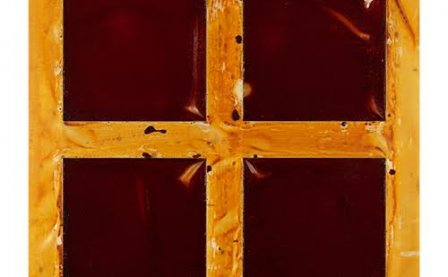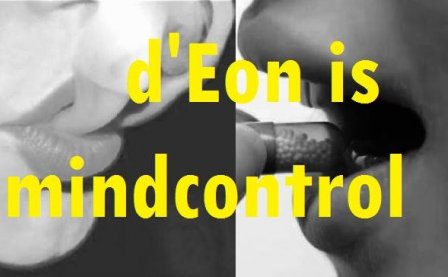There is an irresistible tendency to lump d’Eon in with seemingly similar practitioners of what some would call “alternative R&B” or “meta-pop.” Of course, there is his connection to Grimes, with their shared creation myth in the Montreal loft scene and their 2011 split, Darkbloom, which will mostly be remembered for showcasing an almost fully metamorphosed Grimes. Similarly, d’Eon’s rise has coincided with other bedroom pop astronauts like How To Dress Well and Autre Ne Veut, who filter commercial R&B sounds through their own unique perceptions. And then there is a predisposition shared with Ford & Lopatin to both explore schmaltzy synth sounds and nose around the edges of adult contemporary from the late 80s and early 90s. In the case of d’Eon, what sets him apart is his investment in the extra-human, a unique spiritual searching in his music that’s absent in the hyper-referentialist pop tendencies (however honest) of his contemporaries. In this way, d’Eon is looking beyond late capitalism’s global pop vortex for something that runs deeper than k-pop or even Aaliyah.
At its core, d’Eon’s first true album is an “oratorio in four parts,” mostly centered around an interest in Gabriel’s revelation to Muhammad and the search for God in today’s information-obsessed society. Although traditional religious concerns and spirituality are seemingly anathema in the indie music world, d’Eon’s religious quality shouldn’t be surprising coming from a guy who sought refuge from the wired world by going to a Himalayan monastery, but yet, throughout all the upturned-palms-to-heaven musings, I kept waiting for a hint of irony or some acknowledgment that it’s all just motif-for-motif’s sake. However, my doubts were put to rest with songs like “Chastisement,” which is as serious as self-flagellation, and closer “Al Qiyamah,” which ends in an apocalyptic cacophony of 56k modem squelch and the dire warning of air raid sirens. Others, such as “Gabriel II,” hurl questions like “What happened 1,400 years ago to make Him cut us off/ Do we really deserve the silent treatment?” into the void. At other times, d’Eon’s higher-minded concerns are with the role of God in today’s world, living in the cloud, and the potential of the Singularity: “If everybody can see everybody/ What’s the point of omniscience?” he posits on “Chastisement.” But it’s not the sort of misty-eyed post-humanist desire you would imagine, as he plaintively notes, “I don’t want to be swallowed by the internet.” Here, it’s interesting to compare d’Eon with contemporary Pictureplane and his full-on trans-/post-humanist ideology, a leaning present in most of d’Eon’s contemporaries (and maybe even with d’Eon himself, albeit with stated reservations).
So, a new age interpretation of 12 Play this is not. Rather than seeking to play pop star, d’Eon is more comfortable in a composer/producer role, constructing dense, meticulously made numbers often clocking in at over six minutes. Sure, on the surface there are nods to toe-curling Usherisms (“Virgin Body”) and smooth balladeering (“Century By Century”), but the hope of anyone looking for this to be a sort of avant-pop manifesto is undermined by the heavy subject matter or off-putting difficulties of extreme vocal pitch-bending and juke-like polyrhythms (“Signals Intelligence”). No doubt d’Eon respects and even wants to work with pop stars (one could easily see him dialing the weirdness down), but on his own, he is more concerned with articulating his personal vision, which is more closely related to minimal composers such as Steve Reich and Terry Riley. In a recent interview with FACT, d’Eon discussed his compositional belief that “notes are [eternal]” and “inherently present in the universe, and we as people just need to pluck the right frequencies out of the sound spectrum and combine them in ways that are interesting to the ear.” Indeed, d’Eon considers himself more of a keyboardist than a charismatic frontman, and this is evidenced by the electrifying extended keyboard jams on tracks like “Transparency Pt. II” and the transcendent improvisations of his recent volumes of Music For Keyboards.
Despite all the aforementioned obstacles to accessibility that maybe aren’t as prominent in the work of someone like Grimes or even How To Dress Well, there are some wonderful pop moments here. “My iPhone Tracks My Every Move” and “I Don’t Want To Know” feature the sort of drifty devotional mysticism present in early-90s touchstones PM Dawn, while d’Eon’s propensity to coat his vocals in reverb draw an undeniable line directly to Phil Collins at his smoothest and most corporeal. In fact, d’Eon’s confident vocal performance here is a significant upgrade from past work, not only in the upfront clarity of his lyrics, but also in his experimentation with layering and pitch-bending, which, although at times completely bewildering and even a little disturbing, should be lauded for their sheer weirdness. There are even nods to saccharine adult contemporary in d’Eon’s judicious use of keyboard and pan-flute sounds. Being reminiscent of Bruce Hornsby or Steve Winwood would seem like willingly sending one’s cred to the firing squad, but for d’Eon, they somehow work in the way that a Cosby sweater is unquestionable on the right person.
So, then, d’Eon’s LP is a deeply complicated work in all respects. At nearly 80 minutes, its runtime is exhausting on its own. As a whole (and it really must be taken that way), it’s a difficult listen that will undoubtedly put off many listeners, even upon cursory listens. Those expecting a sort of male version of Visions are going to be sorely disappointed. While Grimes’ album was an undoubtedly sophisticated pop affair, d’Eon’s is a difficult concept record, one that you won’t be able to spend time with in the same manner. Even after a few highly invested listens, I’m not sure that this is necessarily a very ‘likable’ record on the whole, but it does have the aura of a significant one that will gain a strong cult following. One thing is for sure: d’Eon is an engaging artist. Whether or not he delves deeper into religious devotionals or produces beats for Rihanna, we should all be paying attention.
More about: d'Eon




